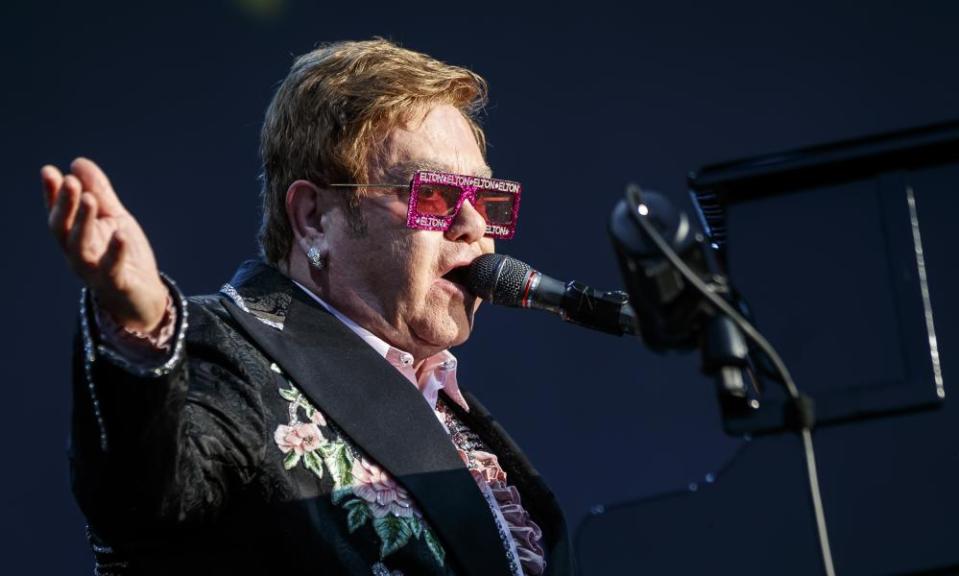James Graham reveals Covid crisis accelerated Elton John musical collaboration

For writer James Graham, one plus side from the grind of 2020 was being able to work with Elton John and Jake Shears on a new musical telling the wild story of televangelist turned gay icon Tammy Faye Bakker.
Graham has written the book, John the music and Shears the lyrics. The project has been brewing for two years and because John had to cancel his farewell tour this year he had more time to get it finished. “We’ve made real progress and we got a workshop together in November,” said Graham. “We hope we might get it in to a theatre second half of next year.”
Related: 'Christmas fiasco' as London move to tier 3 shuts West End theatres
It was John who thought Bakker, a big-haired, shoulder-padded embodiment of 1980s televangelism, would make a great musical. “She became basically a gay icon because of her liberal support for the gay community during the Aids crisis.”
Graham said he was also interested in the intersection of evangelicalism and Reaganism and how that happened again with Trump. “That sounds really boring and dry doesn’t it,” said Graham. “But it’s with some kick-ass tunes by Elton John!”
Working with John and Shears provided some welcome relief from what was a rollercoaster year for Graham, who was a passionate and vocal campaigner to get government help for the Britain’s threatened performing arts sector.
His high-profile involvement was an accident of timing in a way, Graham says, in that his ITV series Quiz, telling the story of the coughing major on Who Wants to be a Millionaire, was broadcast in April meaning he had to do lots of publicity and interviews.
Graham also donated his TV fee from Quiz to a fund helping freelance workers. The drama came from a stage play with actors and creatives helping to develop it, he said. “I just felt that was a clear example of my profiting from something that was made collectively.”
In May he appeared on Question Time, powerfully articulating the case for investment. He’d been warned that arguing for arts funding at a time of global financial collapse might bring a social media backlash. “To my absolute surprise it was way more positive and receptive than I thought and I think that was partly because people had really valued drama and entertainment, in whatever form, during lockdown.”

It was not until July that the government finally announced its £1.57bn rescue package for arts and heritage.
Many saw it as long overdue. On the Sunday it was announced, Graham was at his lowest ebb because of newspaper stories suggesting a secret plan to mothball theatres. Whether that was a strategic move by Dominic Cummings, “to puncture our faith, makes us grateful hours later” he does not know, but if it was the strategy “it worked”.
Oliver Dowden, the culture secretary, spoke to Graham directly to reveal the deal. “I was so surprised at the number and so grateful and so relieved. It certainly wasn’t perfect. I had huge fears about how it would filter down to the freelance artists. But because it was of a scale I knew thousands of jobs were going to be saved and it would make a difference.”
Graham has fears and optimism for the future of theatre, a sector which pre-pandemic was one of Britain’s shining success stories.
“I don’t want to romanticise it to say that we’re going to come out of this stronger or we’re going to build back better like that’s an inevitability, because I don’t think it is. It is going to be incredibly tough for buildings and theatre companies to get through the next few years.
“We’ve lost tens of thousands of freelance artists and technicians who have had to leave to find work elsewhere and they won’t come back and we don’t know what is going to happen to audiences, how hard it will be to bring them back to physical proximity with each other.
Related: Waiting in the wings: how a second lockdown halted theatre's comeback
“But I think we’ll get there. I do think it is an opportunity to step back and reassess the structural problems within buildings and the sector which were many, in terms of who got to make work and who got to access work.
“I think there is a real commitment from industry leaders to shake that up. I think progress is being made.”
In practical terms theatres will have less money for years, meaning shows “which are slightly rougher and readier” but within that “we might just discover some fresh, original styles and approaches that makes work more inventive and more exciting.”
Aside from the musical with Elton John, Graham is working on a screenplay for his Rupert Murdoch play Ink and developing a TV series set in his home county of Nottinghamshire.
Graham is known for dramatising contemporary events, not least his 2019 Brexit TV drama, which introduced Dominic Cummings to the wider world, played by Benedict Cumberbatch.
There probably is something to be written from the pandemic but he does not yet know what. “I get people constantly saying is there a Cummings sequel about his road trip to Barnard Castle, I think no actually, certainly not from me, when I first tackled him he was relatively unknown and unfamiliar. For me it will be about finding the unfamiliar.”


